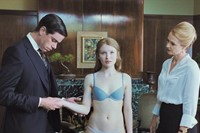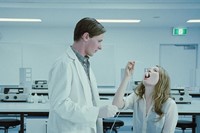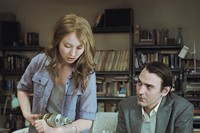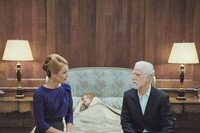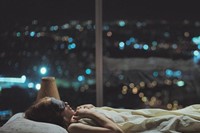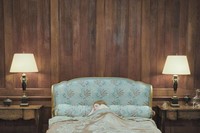Australian novelist-turned-filmmaker Julia Leigh's debut feature Sleeping Beauty has been strongly dividing audiences since its Cannes premiere. A visually elegant, complex exploration of time and potency that's witty and darkly melancholic by
Australian novelist-turned-filmmaker Julia Leigh's debut feature Sleeping Beauty has been strongly dividing audiences since its Cannes premiere. A visually elegant, complex exploration of time and potency that's witty and darkly melancholic by turns, it sees university student Lucy (Emily Browning) take on a job as a Sleeping Beauty. This requires her to be drugged into a deep sleep, so ageing men can indulge in their erotic encounters without a soul gazing on their wrinkled flesh. “It will be as if those hours never existed,” declares her boss. Watching all unfold inside the chamber, we as audience occupy a curious position as witness. And as Lucy's own urge to see what happens while she sleeps grows, transgression from the rules becomes irresistible to her. AnOther caught up with the director in London, where Sleeping Beauty opened on Friday, to discuss the tales and nightmares which bled into the film.
Where did your idea for the film come from, and of a sleeping beauty chamber?
The question of where does something come from is always quite odd because the true answer is it's mysterious even to me. It's an exercise in hindsight going back. I know I'd read the classic fairytale Sleeping Beauty – and by the way the original fairytales were quite brutal, not the Disney versions – and also read and really loved two well-known novellas, one by Yasunari Kawabata and the other by Gabriel Garcia Marquez. They're both stories told from the point of view of older men who pay to sleep alongside drugged young girls. In the bible King David sets out to spend the night alongside sleeping virgins, there are sleeping girls on the internet... So this concept of the sleeping beauty was out there in the ether, and I guess I responded to that and transformed it.
On a more personal note, after my novel The Hunter was published, I had a recurring nightmare that I was being filmed in my sleep. It was very compelling because you dream you're asleep in your own bed when you are in fact asleep in your own bed and it's very hard to tell the difference between what's real and what's not. I realise that we are all quite vulnerable in our sleep. I wondered what it would be like to know that something was happening to you in your sleep, and that it probably wasn't good for you. How would that seep into your waking life, and maybe destabilise it? This is the sort of situation that Lucy finds herself in.
It's also a potent metaphor, these ageing men entering what's to her a timeless state...
On the one hand you have Lucy's youth and her quiet and wilful recklessness and perhaps being death-haunted in a way that she might not even care if she lives or dies. Very, very reckless. And then you have portraits of the older men, who are death-haunted in a different way because they're fast approaching death. I think the film works as whole, as a totality, because you see youth and old age in relief, and how they play off one another.
You've leapt from novel-writing into filmmaking – what inspired you to take that risk?
I guess for me the script was a stepping stone. I wrote the script first and at the time I wrote it I wanst thinking that far ahead, and so I didn't immediately think I would direct it. The novelist and the filmmaker are both working with the flow of time, long narratives, complex worlds, complex characters, hopefully they both have something they want to explore. I think the sea of loneliness of the writer is also there in the director in a way, because the director is really the only one who has the whole film in their head. So in that way they're kind of similar, but the process thereafter is very different.
The look of the film is striking – elegant yet idiosyncratic...
I was not interested in a strict naturalism – this film is very far from the kitchen sink. So I was seeking – its hard to pinpoint exactly what it is, but let's say a strangeness, or a heightened realism. An otherworldliness in a way. I had a great production designer, Annie Beauchamp, and we both are from Sydney. She came on very early, months before the film and we had some time to spend on this outside the initial production.
Emily Browning is great in it – did you have a particular idea beforehand of the kind of actress you wanted to play Lucy?
She put down a test I saw, and that's what gained my attention. I couldn't take my eyes off her. I do find her very beautiful. She has an unusual beauty that appeals to me, and she really got this sense of a quiet and wilful recklessness. She's not a simply passive character, she's quite radical I think and her first provocation to the world is: “My cheek is turned, try me.” And Emily side-stepped the major danger which would have been self-pity or something like this, she's not at all self-pitying. She's also not numb, hopefully you see that in her close friendship with Birdmann. Emily was very brave, she really had no qualms about the role. She's a great actor so she gives her all to the character.
Sleeping Beauty is in UK cinemas now.
Text by Carmen Gray
